

FULL STORY
The Block Institute: Moving Investigators' Work from Bench to Bedside
Years of painstaking work are typically required for basic researchers to make discoveries and publish their findings in peer-reviewed journals. So imagine the frustration of making a discovery with major therapeutic potential—then watching as it sits on the shelf for lack of a clinical research partner, a clinical trials designer or a biostatistician. Such dead ends occur all too often, depriving patients of potentially useful therapies. Einstein and Montefiore addressed this problem in 2007 by creating the Institute for Clinical and Translational Research (ICTR). The work of the ICTR has been helped by a generous bequest from the estate of Muriel Block in support of medical research at Einstein. In 2013, in honor of Mrs. Block and her husband, the ICTR was renamed the Harold and Muriel Block Institute for Clinical and Translational Research at Einstein and Montefiore. Another financial boost came from the NIH, which recently renewed the Clinical and Translational Science Award, a $25 million, five-year grant to Einstein that provides part of the Block ICTR's funding. The Block ICTR supports investigators by providing critical infrastructure for carrying out their research—biorepositories for patient specimens, facilities for developing biomarkers, clinical research support staff, experts in clinical trial protocols, specialists in recruiting patients and more. The Block ICTR also helps the careers of junior scientists through novel educational programs and career development.
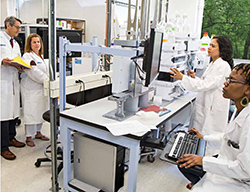
The Biomarker Analytic Research Core—the ICTR’s central laboratory—provides uniform, accurate and cost-effective specimen collection and biomarker analyses for Einstein and Montefiore investigators."These core resources enable researchers to perform clinical and translational research more easily and efficiently and without needing to 'reinvent the wheel' for every project," says Block ICTR co-director Dr. Harry Shamoon, associate dean for clinical and translational research and a professor of medicine (endocrinology) at Einstein and attending physician in medicine at Montefiore. Some of the key Block ICTR components are:
- the Clinical Research Training Program, which is training the next generation of bench-to-bedside investigators;
- the Therapeutics Sciences Bridge, which aids translational programs in chemical biology, genomics and drug design in collaboration with Einstein's Center for Experimental Therapeutics; and
- the Outcomes Research Collaborative, which works with the Center for Comparative Effectiveness Research on patient-centered and population-centered outcomes research.
A Critical Resource
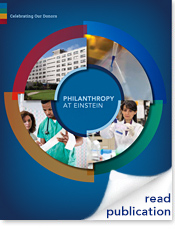
This article originally appeared in the Einstein Philanthropy Report 2013. Last year, more than 300 Einstein and Montefiore investigators, with a total of $90 million in NIH research grants, made use of Block ICTR resources. One investigator who benefits from the Block ICTR is Dr. Bernice E. Morrow, a professor of genetics, of obstetrics & gynecology and women's health and of pediatrics (cardiology) and the Sidney L. and Miriam K. Olson Chair in Cardiology. She studies two rare disorders: velo-cardio-facial syndrome/ DiGeorge syndrome and X-linked deafness type 3, each of which can cause hearing loss. Her focus is on two genes that appear to cause these syndromes due to mutations. Dr. Morrow is using the Block ICTR's Clinical Investigational Services core to obtain DNA and clinical data from patients with genetic hearing disorders. Her work has already helped identify several novel mutations that cause hearing loss. Dr. Morrow also directs the department of genetics' division of translational genetics.
Another investigator is Dr. Eric Hollander, clinical professor of psychiatry and behavioral sciences and director of the Autism and Obsessive-Compulsive Spectrum Program at Einstein and Montefiore. He is using the Biostatistics, Epidemiology and Research Design core to help with a clinical study assessing whether a novel drug, R05028442, can help high-functioning autistic adults.
The Block ICTR also supports the development of new research networks and clinical trials. Einstein recently obtained NIH grants to create a regional stroke research center and a nationwide comparative effectiveness study evaluating treatments for type 2 diabetes.
The Harold and Muriel Block Scholars
The late Muriel Block was a passionate supporter of medical research. Her gift last year of more than $160 million is the largest in the College of Medicine's nearly 60-year history, and part of it will support 11 faculty members. The holders of Einstein's new Harold and Muriel Block chairs and faculty scholar position will use the funds for a wide range of research projects.
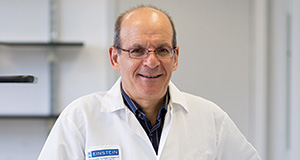 Dr. Michael Aschner
Dr. Michael Aschner
Harold and Muriel Block Chair in Molecular Pharmacology
Dr. Aschner came to Einstein in 2013 from Vanderbilt University Medical Center in Nashville, TN. For the last 25 years, his laboratory has studied how heavy metals are taken up and distributed in the brains of newborns and how those metals induce neurodegeneration. His research may lead to new drugs that can help treat neurodegenerative disorders and provide better research models for human diseases. Funds from the Block endowment "are enabling our laboratory to join in international collaborations, buy new technological platforms, gather preliminary results for future grant submissions and help translate the research from bench to bedside," he says. Dr. Aschner is principal investigator on several research grants from the NIH and has served on numerous national and international toxicology panels. He is a professor in the departments of molecular pharmacology and of pediatrics and in the Dominick P. Purpura Department of Neuroscience. He is also the director of the Einstein Center of Toxicology.
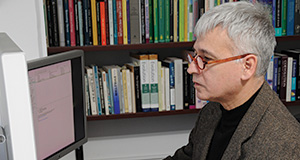 Dr. Aviv Bergman
Dr. Aviv Bergman
Harold and Muriel Block Chair in Systems & Computational Biology
Dr. Bergman uses data from basic and clinical research to create computer models of aging, cancer, neurodegenerative diseases and other complex biological systems. His research areas include the causes and effects of "robustness" (the ability to withstand stresses, pressures or changes in environment); the evolution of gene networks; and genes involved in human longevity and cancer. These models may predict a person's medical outcome and guide individualized treatment for patients based on their genetic makeup. Dr. Bergman's Block Chair allows him to delve more deeply into the evolution of complex traits and diseases by combining math, physics and experimental biology. Dr. Bergman is a professor and chair of systems & computational biology, and a professor in the department of pathology and the Dominick P. Purpura Department of Neuroscience.
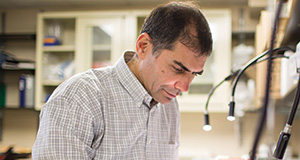 Dr. Pablo E. Castillo
Dr. Pablo E. Castillo
Harold and Muriel Block Chair in Neuroscience
How we think, feel, act and learn depends to a large extent on neurotransmitters—chemicals that travel across the gaps, or synapses, between nerve cells. Dr. Castillo's research is aimed at understanding how neural activity controls the strength of synaptic connections in the brain and how dysregulated neural communication contributes to neuropsychiatric problems such as schizophrenia, autism spectrum disorders, epilepsy and Alzheimer's disease. Thanks to the Harold and Muriel Block Chair, Dr. Castillo is now studying the actions of synaptic proteins whose alterations have been linked to familial forms of autism. He is also developing new imaging technologies that reveal synaptic function under normal and pathological conditions. Dr. Castillo is a professor in the Dominick P. Purpura Department of Neuroscience.
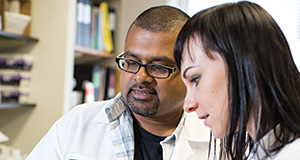 Dr. Kartik Chandran
Dr. Kartik Chandran
Harold and Muriel Block Faculty Scholar in Virology
Dr. Chandran is known for his pioneering research on the Ebola virus and similar viruses. Ebola is one of the world's deadliest viruses, with a mortality rate of up to 90 percent among those infected, and there is no known cure. Dr. Chandran's laboratory helped identify the role of a protein receptor that Ebola "unlocks" to invade and infect cells. This finding suggests a possible strategy for blocking Ebola infections. Last year, Dr. Chandran's work earned him a five-year, $4.8 million grant from the NIH to study the molecular mechanism that allows the Ebola virus to infect animals. The Block support is helping Dr. Chandran's research team explore whether the newly identified Ebola receptor determines which animals the virus can infect. Dr. Chandran is an associate professor of microbiology & immunology.
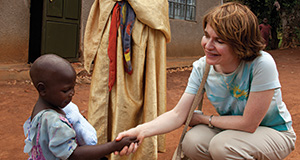 Dr. Meredith A. Hawkins
Dr. Meredith A. Hawkins
Harold and Muriel Block Chair in Medicine
Dr. Hawkins travels the globe investigating diabetes—the reasons for its dramatic rise and what can be done about it. She studies the role of nutrients and inflammation in causing diabetes, and vitamin D's effect on diabetes management and treatment. Her team provided the first evidence indicating that the brain regulates glucose metabolism in humans. Dr. Hawkins is the founding director of the Global Diabetes Institute at Einstein, which conducts diabetes research and training for healthcare workers in Africa and Asia. Collaborating with researchers in India, Dr. Hawkins is investigating malnutrition diabetes, a little-understood form of the disease that particularly affects people in the developing world. The Harold and Muriel Block Chair is allowing Dr. Hawkins to expand her research efforts at home and abroad. Dr. Hawkins is a professor of medicine (endocrinology) at Einstein and an attending physician in medicine (endocrinology) at Montefiore.
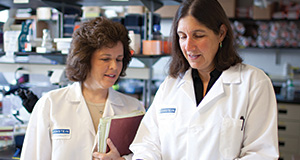 Dr. Betsy Herold
Dr. Betsy Herold
Harold and Muriel Block Chair in Pediatrics
Dr. Herold is developing new strategies to protect women from being infected by HIV (the virus that causes AIDS) and by herpes simplex viruses (HSV), which cause genital herpes. Her team is developing an intravaginal ring that releases protective concentrations of a drug that inhibits both types of viruses. In preclinical studies, the ring protected macaques from infection. With support from the Harold and Muriel Block Chair, Dr. Herold hopes to discover why people co-infected with HIV and HSV have trouble controlling their HIV infections—knowledge that might greatly help HIV treatment efforts; worldwide, more than 50 percent of people infected with HIV are co-infected with HSV. Dr. Herold is a professor in the departments of pediatrics (infectious disease), of microbiology & immunology and of obstetrics & gynecology and women's health, director of the "Empower" Translational Prevention Research Center at Einstein and an attending physician in pediatrics at The Children's Hospital at Montefiore.
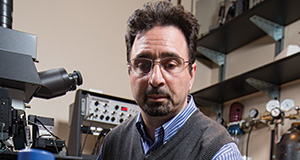 Dr. Kamran Khodakhah
Dr. Kamran Khodakhah
Harold and Muriel Block Chair in Neuroscience
Dr. Khodakhah studies the role of two brain regions, the cerebellum and basal ganglia, in motor coordination and movement disorders such as ataxia (uncoordinated movement) and dystonia (involuntary muscle contraction). He and his colleagues combine basic science and clinical approaches, including behavioral studies, electrophysiology, genetics and optogenetics. Dr. Khodakhah's team recently identified an interaction between the two brain regions that contributes to hereditary dystonias. The Block funds will allow him to continue his search for dystonia treatments. "The endowment from the Block family is a humbling reminder of the generosity of mankind," he says. Dr. Khodakhah is a professor in the Dominick P. Purpura Department of Neuroscience and interim chair of the department.
 Dr. Mimi Kim
Dr. Mimi Kim
Harold and Muriel Block
Chair in Epidemiology & Population Health
Dr. Kim uses statistical methods to design and analyze clinical trials and epidemiologic studies (looking for factors that affect the health of populations). She collaborates on studies involving cancer, rheumatology and HIV/AIDS. Dr. Kim has headed the division of biostatistics since 2003 and also directs the biostatistics shared resource in the Albert Einstein Cancer Center and the biostatistics, epidemiology and research design core of the Institute for Clinical and Translational Research. Thanks to her new chair, says Dr. Kim, she can "work on developing statistical prediction models for disease and pregnancy outcomes in women who suffer from autoimmune disorders such as lupus and conduct research into innovative clinical trial designs that will allow for more efficient evaluation of new treatments." Dr. Kim is a professor of epidemiology & population health and the director of Einstein's new Quantitative Sciences in Biomedical Research Center.
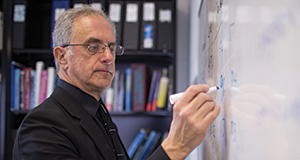 Dr. Thomas E. Rohan
Dr. Thomas E. Rohan
Harold and Muriel Block Chair in Epidemiology & Population Health
Dr. Rohan looks for nutritional, hormonal and genetic factors that cause cancer and worsen its prognosis. His recent work has involved identifying molecular changes in benign breast disease tissue that predispose women to develop breast cancer. Other studies have involved large groups of people, mostly within the Women's Health Initiative cohorts, the Canadian National Breast Screening Study dietary cohort and the Canadian Study of Diet, Lifestyle and Health. He also studies the microenvironment of breast tumors to see if the presence of certain cells can predict whether a tumor is likely to metastasize. Holding the Harold and Muriel Block Chair "has emboldened me to undertake more high-risk, high-gain research," says Dr. Rohan. Dr. Rohan is a professor and chair of epidemiology & population health at Einstein and Montefiore.
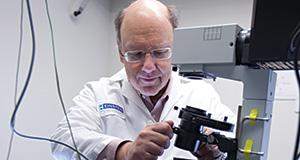 Dr. Robert H. Singer
Dr. Robert H. Singer
Harold and Muriel Block Chair in Anatomy and Structural Biology
Dr. Singer develops new ways to visualize basic processes in living cells. His research has helped illuminate gene expression, in which a gene's DNA is transcribed into messenger RNA molecules that serve as blueprints for protein synthesis. He was the first scientist to visualize single molecules of messenger RNA being transcribed in living mammalian cells. His work has also revealed the molecular interactions that allow messenger RNA molecules to travel from the nucleus and into the cytoplasm, where protein synthesis occurs. The Harold and Muriel Block Chair permits Dr. Singer "to pursue innovative avenues that would be considered risky without the support of the endowment," he says. Dr. Singer is a professor and co-chair of anatomy and structural biology, a professor of cell biology, a professor in the Dominick P. Purpura Department of Neuroscience and co-director of the Gruss Lipper Biophotonics Center and of the EGLCF Integrated Imaging Program.
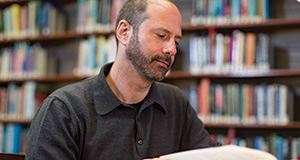 Dr. Howard D. Strickler
Dr. Howard D. Strickler
Harold and Muriel Block Chair in Epidemiology & Population Health
Dr. Strickler is a molecular epidemiologist whose work has provided important new insights into how obesity is linked to cancer, with implications to cancer screening, prevention and treatment, as well as to the pathways that may lead to type 2 diabetes. He recently showed that optimal levels of certain blood proteins are associated with a five-fold reduction in risk for developing type 2 diabetes a decade or more later. The presence of these same proteins may also explain the elevated cancer risk faced by obese women and men. Dr. Strickler explains that his Harold and Muriel Block Chair "allows me to carry out in-depth research into the molecular interconnections among obesity, diabetes and cancer—which I might not otherwise be able to pursue." Dr. Strickler is a professor of epidemiology & population health, head of the division of epidemiology and co-leader of the Cancer Epidemiology Program.
Posted on: Thursday, July 3, 2014


